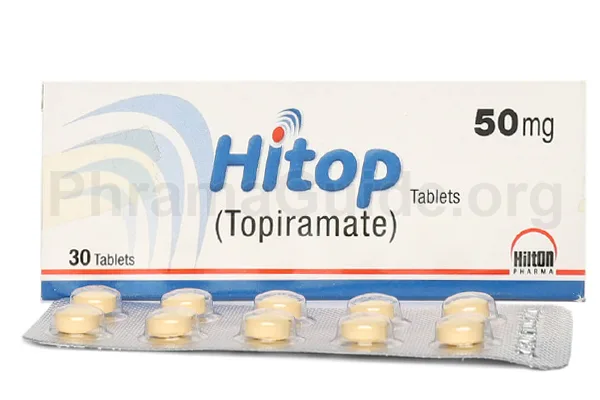Hitop is a medication used to treat epilepsy, migraines, and sometimes for weight loss or bipolar disorder. It can have various side effects, some of which are more common than others. It’s important to note that not everyone experiences these side effects, and their severity can vary from person to person. Some common and less common side effects of Hitop include:
Common Side Effects
- Dizziness or lightheadedness: Feeling dizzy or unsteady on your feet is a common side effect when starting Hitop. It might improve as your body gets used to the medication.
- Drowsiness or fatigue: Some individuals might feel more tired or drowsy than usual, especially at the beginning of treatment or when the dosage is increased.
- Tingling sensations: Some people experience a sensation of pins and needles, often in the hands and feet.
- Nausea or upset stomach: Hitop can cause gastrointestinal discomfort, leading to nausea, stomach pain, or diarrhea.
- Changes in taste: Some individuals report alterations in taste perception, which can make certain foods taste different or less appealing.
- Weight loss: A notable side effect for some people is a decrease in appetite, leading to weight loss. This effect can be more pronounced in some individuals.
- Difficulty concentrating or thinking: Some people might experience difficulties with memory, concentration, or attention while taking Hitop.
- Mood changes: Mood swings or changes in mood, including irritability or depression, can occur in some individuals.
- Vision problems: Hitop might cause blurred vision, eye pain, or other vision disturbances.
- Increased risk of kidney stones: There’s a higher risk of developing kidney stones while taking Hitop. Staying hydrated can help reduce this risk.
Less Common Side Effects
- Mood changes or psychiatric symptoms: While mood changes are common, less frequent but more severe psychiatric side effects such as suicidal thoughts, hallucinations, or severe anxiety might occur in rare cases.
- Severe allergic reactions: Some individuals might experience serious allergic reactions with Hitop, presenting with symptoms like rash, itching, swelling (especially of the face, tongue, and throat), severe dizziness, or trouble breathing.
- Liver problems: Elevated liver enzymes or liver damage can occur in rare instances while taking Hitop. Symptoms might include jaundice (yellowing of the skin or eyes), dark urine, or persistent nausea.
- Heat-related issues: Hitop might decrease sweating and increase the risk of overheating or heat-related disorders, especially in hot weather. This can lead to a higher risk of heatstroke.
- Glaucoma or increased eye pressure: In some cases, Hitop can cause increased pressure inside the eye, leading to symptoms like eye pain, vision changes, or redness in the eyes. This can exacerbate pre-existing glaucoma.
- Decreased bicarbonate levels: Hitop might cause a decrease in blood bicarbonate levels, leading to metabolic acidosis. This condition can cause symptoms like rapid breathing, confusion, fatigue, and irregular heart rhythms.
- Speech and language problems: Less commonly, some individuals might experience speech difficulties or language problems while taking Hitop.
- Osteoporosis or bone health issues: Prolonged use of Hitop might affect bone health, leading to a higher risk of osteoporosis or fractures in some individuals.
- Abnormal bleeding or bruising: Rarely, Hitop might affect blood clotting mechanisms, resulting in increased bleeding or bruising tendencies.
- Hypothermia: In rare cases, especially when combined with other medications or in specific conditions, Hitop might lead to decreased body temperature.

What is Hitop?
Hitop is one of the leading brands of Topiramate, manufactured and marketed by Hilton Pharmaceuticals (Pvt) Ltd, Pakistan.
Hitop : Available Formulations and Strengths
Presently, Hitop is available in Tablet Form with the following strengths.
Hitop Tablets : 25mg, 50mg, and 100mg strengths.
What Are The Possible Drug Interactions of Hitop?
- Other Antiepileptic Drugs (AEDs): Combining Hitop with other antiepileptic drugs can affect their blood levels and potentially increase the risk of side effects or reduce their effectiveness. Examples include carbamazepine, phenytoin, valproic acid, and phenobarbital.
- Central Nervous System Depressants: Combining Hitop with other drugs that have a central nervous system depressant effect, such as alcohol, benzodiazepines, or opioids, can increase the risk of drowsiness, dizziness, and impaired cognitive function.
- Carbonic Anhydrase Inhibitors: Hitop itself acts as a carbonic anhydrase inhibitor. Combining it with other medications from the same class, like acetazolamide, can increase the risk of metabolic acidosis.
- Oral Contraceptives: Hitop might reduce the effectiveness of hormonal contraceptives (birth control pills), increasing the risk of unintended pregnancy. Additional contraceptive methods might be needed.
- Lithium: Concurrent use of Hitop with lithium, commonly used for bipolar disorder, might increase the risk of lithium toxicity.
- Metformin: There’s a potential interaction between Hitop and metformin (used for diabetes), which might lead to a decrease in metformin’s efficacy.
- Selective Serotonin Reuptake Inhibitors (SSRIs) and Serotonin-Norepinephrine Reuptake Inhibitors (SNRIs): Combining these antidepressants with Hitop might increase the risk of developing serotonin syndrome, a potentially life-threatening condition characterized by agitation, confusion, rapid heart rate, and high blood pressure.
- Methazolamide: Concurrent use of methazolamide with Hitop might increase the risk of metabolic acidosis.
- Pioglitazone: There have been reports of an increased risk of hypercapnia (excessive carbon dioxide in the bloodstream) when pioglitazone is used with Hitop.
- Other Medications: Drugs like hydrochlorothiazide, amitriptyline, risperidone, and digoxin might interact with Hitop, either by affecting its levels or by being affected by it, potentially leading to increased side effects or decreased effectiveness.

Leave A Comment